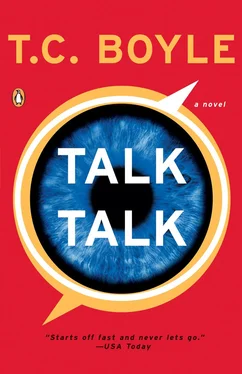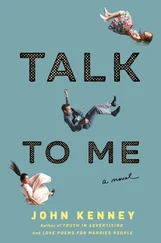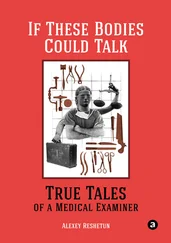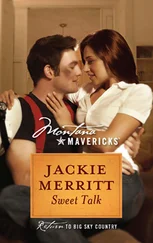Two hours in the chair. The drilling, the gouging, the fitting of the post and the grinding down of the temporary cap: two hours anyone else would have written off. But not Dana. She was, as Bridger was quick to point out-pejoratively-an A-type personality, as if that were something to be ashamed of, as if civilization hadn't been built on the backs of the A-types, as if armies hadn't been led by them, advances made in the laboratory, in the concert hall, the universities and hospitals and everywhere else. Slow down, people told her-“Bridger” told her-relax and live in the moment, but they were B-types, they were slackers. Like Bridger. And were there only two types then? No, she thought, there must be a third type, type C, for Criminal. That man in the photo staring out at her from the fax in the police station, that was what he was: no need to make and build or lie back and smell the roses when you could just simply steal it all.
So she was an A-type. And she had two hours. She understood that it would be somewhat difficult to focus under the circumstances, what with the dentist's fingers in her mouth and the nurse's face hovering in her field of vision like the moon to his sun-no hearing person could have done it-but she was good at shutting out the world, a champion, in fact, and she'd brought the thin sheaf of “Wild Child” along with her. It had been over a week since she'd had a chance even to think about it in any fruitful way, and that nagged at her. She couldn't hope to write under the circumstances-there was no realistic way and she had no expectations-but what Bridger didn't understand was how vital it was to review and revise, to re-enter that world she'd created and find her way to a destination she couldn't even guess at.
The drill bit, the dam held. Dr. Stroud probed. The nurse loomed. And Dana lifted the manuscript in one hand and banished them both, drifting, drifting now into another place altogether, a place where she wasn't Dana Halter of the San Roque School for the Deaf, but a child of eleven, a boy child, nameless, naked, dwelling in his senses. There was a scar at his throat, a raised ragged island of flesh he fingered because it was there, a scar that preceded all the others and took him back to the moment when he found himself waking for the first time to the swaying of the trees and the rhythmic clangor of the birds and insects, attuned to the fierceness of the wind in the branches and the pitch of every note the branches sang. He lived in France, in the untamed forest of La Bassine, but he didn't know it. Lived eighteen hundred years after the death of Christ, but he didn't know that either. All he knew was to dig in the earth for grubs and tubers, to gorge on berries, grasshoppers, frogs and snails, to crouch over his haunches in a nest of leaves and listen to that symphony of the air and the melody the brooks played and the insects of the day and the insects of the night, the earth spinning for him alone and no human voice, no words, to intrude on it…
But Dr. Stroud was there, leaning away from her now, the surgical mask removed, and he was smiling at her-preening himself on a job well done. The nurse was smiling too. “That wasn't so bad, was it?” he said, careful with his lips and teeth and tongue so that she could understand.
“No,” she said, her own lips cumbersome and without sensation, “not bad at all.”
“Good,” he said, “good. Well, you're a model patient, let me tell you.” His eyebrows tented. Both his hands were clenched above his shoulders and rocking back and forth in celebration of their mutual triumph. “If you have any pain, Advil should do it. And nothing too strenuous”-yes, that was it: strenuous-“for the rest of the day. Take some time off. Put your feet up. Relax.”
She nodded, her mouth frozen in a Xylocaine-induced grimace. And then he went on to tell her an elaborate story about one of his other patients, whom he wouldn't name out of professional discretion, but she was something of a hypochondriac-his mouth gaped over the word-and that was the last thing she caught because he forgot himself and began talking so fast even a hearing person would have had trouble understanding him. A term came to her-“motormouth”-and she had to smile, whether he misinterpreted it or not. She was on her feet now, at the door, and he was still talking away, but for all she got of it he might as well have been chewing gum.
MADISON WAS AWAY at the piano teacher's, Natalia was sunbathing on the deck and he was poised over the black granite top of the kitchen counter, mixing their second round of Sea Breezes. He stood there in a cocoon of silence (the CD needed to be punched up but he didn't feel like punching it), appreciating one of those moments when the whole world opens itself up to you, when everything you take for granted in the daily hassle to scratch and grab and assert a little dominance is suddenly right there in front of you and the planet poises on its axis, just balanced, just now. And he wasn't drunk, not yet-that wasn't it. He was just attuned to the little things: the taste of the salt air through the flung-open window, the feel of the delicate layer of ice on the neck of the Grey Goose bottle straight from the freezer, the perfume of the split lime, the sweetness of the cranberry juice and the acid pull of the fresh-squeezed grapefruit in the stone pitcher. He looked out over the salt marsh to the bay beyond, the light like something out of a painting-a thousand gradations of light, from the palest driest Arctic stripes at the wrought-iron rail of the deck to the rich tropical gold poured all over Natalia and the chaise longue to the distant white purity of the sails of the boats tacking against the breeze.
For dinner, he was going to make sea scallops braised with scallions and garlic, with a sauce he'd learned years ago while fooling around at the restaurant (a white wine reduction flavored with shallots and a splash of sherry, dollop of butter, fold in the cream at a galloping boil and reduce the whole thing again till it was a fifth of what you started with). He was thinking rice with it, flavored with bouillon, sherry and sesame oil, and maybe a salad and some sautéed broccolini on the side. Keep it simple. He could have done something more elaborate, because everything was fine and he had all the time in the world, and yet sometimes you just wanted to get back to basics and let the flavors speak for themselves. He could have made dinner rolls from scratch if he'd had the inclination, could have done up something for dessert too, but you couldn't beat fresh-picked raspberries in heavy cream with a sprinkle of sugar and a splash of brandy to burnish the taste. This was how life should be, no hassles and strains and worries, time on your hands, time to stroll through the farmers' market and the wine shop and have a cappuccino and croissant with your lady on a sunstruck morning, time to chop and dice and sear and lay out a nice meal for Natalia's friend Kaylee and what was her husband's name? Jonas, yeah, Jonas. Not a bad guy, really, for a loser. They had a chain of exercise studios-Pilates and the rest of that crap-and he supposed they did pretty well, and that was all right. At least the guy appreciated fine cuisine, a good bottle of wine-at least he wouldn't be wasting his time in the kitchen on a couple of zeroes. The light shifted. The world began to crank round again. His eyes went to Natalia, the sun on her legs, the sheen, the geometry of perfection, and then he came back to the business at hand: cutting two neat pale green wedges of lime to garnish their drinks.
By the time the doorbell rang, everything was ready to go-Madison back from the piano teacher, fed and in her pajamas, the videos selected, the pans laid out and the scallops prepped-and Natalia got up out of the chaise longue in her two-piece and chiffon robe and drifted through the open French doors like something floating on the breeze. She always moved like that-everything in its own sweet time, “Don't rush me, just look at me”-and he heard the greetings at the door and came out of the kitchen with two fresh cocktails in hand. The kid-the daughter, Lucinda-made a bolt for Madison's room and Kaylee, a bony blonde with pinched little shaded glasses and a frizz of hair twisted up in a bun, pulled him to her for an embrace. “Hey,” she was saying, “we just saw the most awesome thing out on the road on the way here, this white bird? — Jonas says it was an egret-just like perched there on the yellow line like it was in the middle of a river or something-”
Читать дальше












